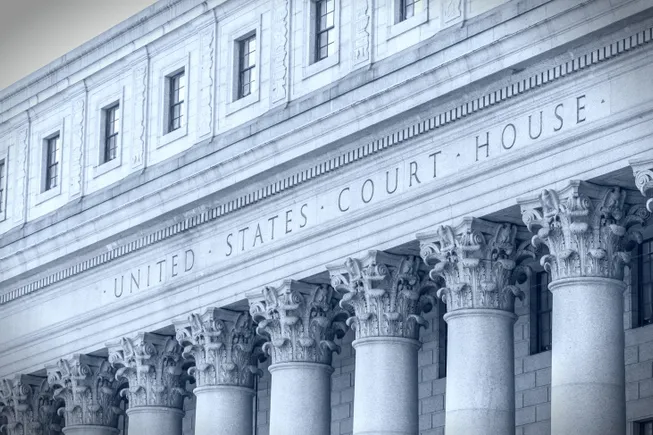Uncertainty continues to plague infrastructure and local weather initiatives as federal businesses defy court docket orders telling them to disburse funding. Federal contractors are navigating the fallout — together with paused and terminated work — as Trump’s directive to halt federal cash continues to be challenged in court docket.
President Donald Trump’s Jan. 20 “Unleashing American Vitality” order advised federal businesses to cease paying out Infrastructure Funding and Jobs Act and Inflation Discount Act funds. Though courts halted the directive, federal businesses have continued to implement the freeze whereas they evaluate initiatives for compliance with the brand new administration’s agenda.
For instance, the Washington DOT has seen cash halted for bridge work and court-mandated culvert substitute efforts, amongst different applications, the Washington State Customary reported.
In a high-profile case, newly appointed Transportation Secretary Sean Duffy ordered a evaluate of the California Excessive-Velocity Rail Authority’s compliance with the phrases of a few of its federal agreements, Mass Transit reported, imperiling $4 billion in federal funding for the undertaking.
A federal decide heard arguments on Feb. 21 about whether or not to additional block the Trump administration from freezing trillions of {dollars} in federal grants and different spending, in a lawsuit introduced by 22 attorneys basic, NPR reported.
Businesses defy orders to dole out funds
Two lawsuits blocked an Workplace of Administration and Finances memo implementing Trump’s order by way of momentary restraining order on Jan. 29. Nonetheless, federal businesses have continued to implement the freeze, arguing the momentary restraining order rulings have a restricted scope, mentioned Jackie Unger, associate and Authorities Contracts Group lead at Washington, D.C.-based legislation agency PilieroMazza, throughout a Feb. 12 webinar.
“Businesses proceed to freeze funds, they’ve refused to renew disbursement of appropriated funds they usually’ve continued to difficulty cease work orders and terminate contracts,” Unger mentioned.
The decide within the Feb. 21 case subsequently mentioned that the businesses’ actions violated his momentary restraining order and clarified the scope, NBC reported, explaining that it prohibits all freezes in obligated funding based mostly on OMB’s memo and Trump’s government order.
“The clarification could give contractors the power to problem company actions in response to the chief orders, in the event that they’re seeing impacts from these,” Unger mentioned.
The federal government has appealed the momentary restraining orders as much as the First Circuit Court docket of Appeals, per Unger, however the courts have to date rejected requests for an instantaneous keep, which might have allowed the funding freeze to return into impact. As the difficulty works its method by the authorized system, the exact implications of Trump’s order might not be absolutely understood for months.
Within the meantime, listed here are some steps that civil contractors can take if they’re going through orders to cease work.
Coping with cease work orders
A federal contracting officer can inform contractors by way of written order to cease work at any time, usually beneath the Federal Acquisition Regulation 52.242-15 clause, for a 90-day window, mentioned Lauren Brier, associate at PilieroMazza, within the webinar. The officer can prolong that interval, however they should have affordable justification and it must be agreed upon by each events, so contractors can push again.
Contractors are entitled to standby prices, that are overhead or prices that straight end result from the cease work order, however they have to additionally mitigate the scenario by furloughing workers, speaking on lease prices and demobilization on jobsites, for instance.
“As soon as a cease work order is issued, the contractor has an instantaneous responsibility to mitigate prices,” Brier mentioned. “You may’t simply have folks sitting in your payroll for the 90-day interval and count on the federal government to make that cost.”
The contracting officer is required to make an equitable adjustment within the supply schedule and contract value, Brier mentioned. Requests for equitable adjustment are usually due inside 30 days of the raise of the stoppage and will embody gadgets comparable to legal professional’s charges, administrative prices and inner prices.
Nonetheless, “there’s no regulatory requirement for the federal government to reply, to allow them to sit on that,” Brier mentioned.
In mild of that potential delay, she supplied some greatest practices for coping with cease work orders:
- Instantly inform your contracting officer of your intention to file a request for equitable adjustment.
- Start working to mitigate prices and file proof of mitigation.
- Doc efforts to implement cease work.
- Contemplate submitting a declare in lieu of a request for equitable adjustment to make sure well timed processing of the associated fee request.
“One other factor that we’re suggesting purchasers do is after they obtain a cease work discover, that they reserve their proper to problem the high-level directive to cease work,” Brier mentioned. “As a result of numerous these courts are beginning to decide these funding freezes as unlawful or illegal, probably these cease works which can be flowing from these government orders are equally illegal.”







